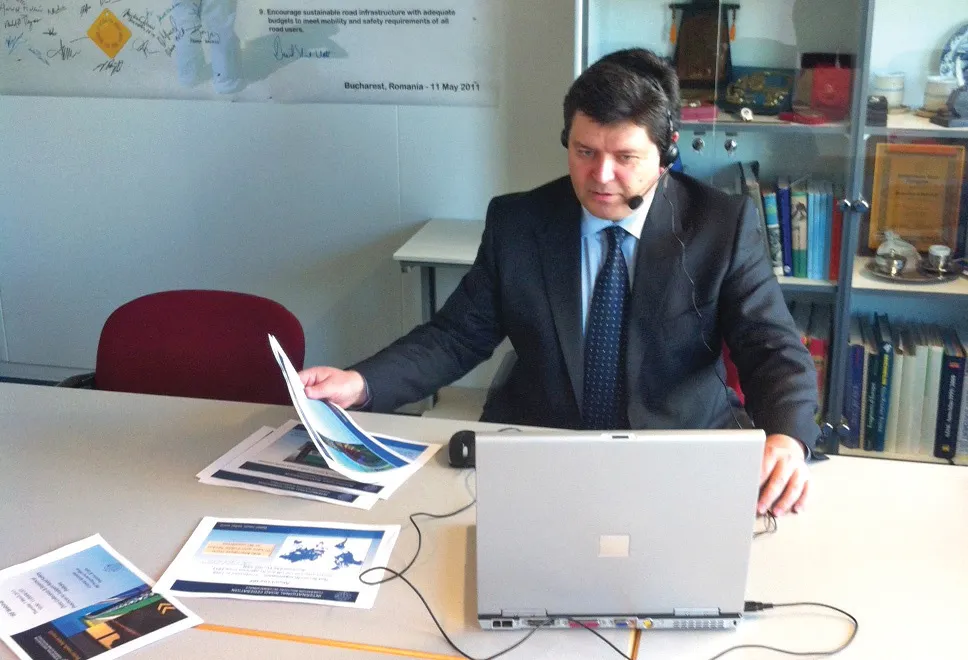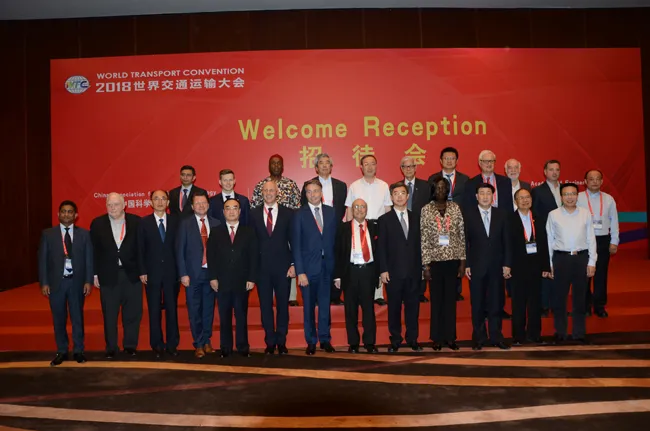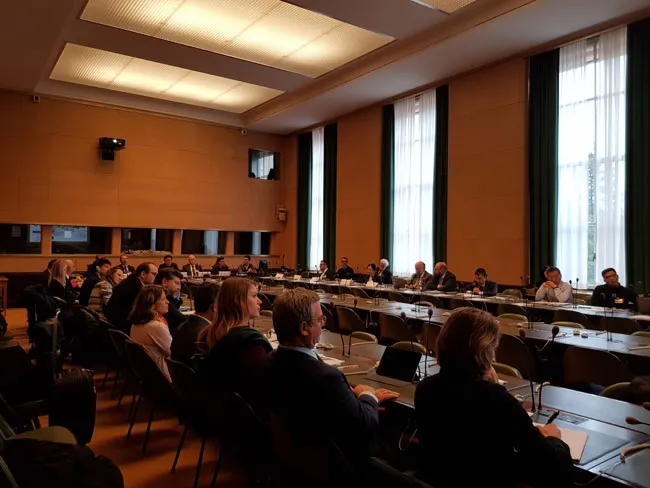Prominent new publication reinforces IRF Geneva’s long-standing commitment to making sustainable transport a reality
Moving Towards Green Road Infrastructure: Case Studies and Lessons Learned’ is the latest in a series of practical resources developed by IRF Geneva aimed at identifying tangible solutions for encouraging sustainability at every stage of the road infrastructure life cycle.
Formally launched last December in the framework of the IRF Geneva Summit ‘Bringing Policy and Practice Together’,
March 13, 2014
Read time: 4 mins

Prominent new publication reinforces IRF Geneva’s long-standing commitment to making sustainable transport a reality
Moving Towards Green Road Infrastructure: case Studies and Lessons Learned’ is the latest in a series of practical resources developed by1201 IRF Geneva aimed at identifying tangible solutions for encouraging sustainability at every stage of the road infrastructure life cycle.
Formally launched last December in the framework of the IRF Geneva Summit ‘Bringing Policy and Practice Together’, the new publication represents an important milestone in the IRF Environment Committee’s programme to raise awareness, develop tools to stimulate effective practical action, and generally serve as a catalyst for dynamic innovation throughout the sector.
Achieving sound environmental and sustainability outcomes has long been an integral part of the policy and practice promoted by IRF Geneva on behalf of its members. The new publication further reinforces a collective resolve to be at the vanguard of ongoing efforts to improve the environmental performance of the road sector. As such, it complements the series of existing guidelines and resources developed by the Committee, including notably a landmark IRF Policy Statement on the Environment and a CD-ROM showcasing innovative practices for greener roads that have already provided valuable inspiration, as well as case studies for potential emulation, drawn from IRF Geneva’s global membership.
Building on this practical emphasis, the projects examined in the new publication make provision for sustainability at every stage of the road infrastructure life cycle: from planning, design and construction, right through to management, operation, maintenance and rehabilitation. Once again, the text is underpinned by a comprehensive set of Case studies that have been carefully selected to provide a range of examples that are both robust and appropriately diverse in nature and geographical scope. Indeed, as highlighted by the coordinator of the Environment Committee, Susanna Zammataro, “When addressing the subject of a road project’s impacts on the environment, there can be no one single method for achieving success. Each road project is distinct and will require its own specific blend of different environmental adaptation and mitigation techniques and measures."
In order to ensure that the resource remains dynamic and up-to-the minute, an e-Book format has been adopted so that the text may be regularly updated and enriched with new Case studies and interactive materials
Ongoing knowledge sharing and dissemination efforts will also be supported through IRF Geneva’s global Transport Knowledge Practice web portal (www.gtkp.com). Furthermore, during3278 ITS Summit meeting in Geneva in advance of the launch, the Environment Committee confirmed a proactive stance with respect to current debate on Green Public Procurement. Specifically, it resolved to initiate through the IRF community the development of a voluntary commitment on sustainable transport. This would notably be conceived to complement pledges made by other partners within the SLoCaT Partnership on Sustainable Transport, a multi-stakeholder grouping of over 80 leading organisations, including IRF, promoting the integration of sustainable transport in global policies on sustainable development and climate change.
Such efforts “underscore the strategic relevance of IRF’s commitment” affirms the Chair of the Environment Committee, Dimitris Mandalozis, and the effort invested in developing the new IRF Geneva publication represents a key element of “our contribution to the global effort, aiming at tracking the sustainability of the transport sector. Together with other partners and organisations, we are working to ensure that transport becomes an integral and important part of the post-2015 development framework."
Certainly the Committee is confident that, as Zammataro concluded, “If widely adopted and wisely applied, the recommendations provided in the new publication will prove that economic development and protection of the environment need not be irreconcilable goals and that viable green road infrastructure is today a reality.”
Initiated in 2007, the IRF Environment Committee's mission is to advocate for environmentally sustainable road development, maintenance and operation, by means of raising awareness, providing policy guidance and stimulating exchanges of knowledge and good practice. Benefitting from the expertise of members drawn from the public and the private sectors worldwide, the IRF Environment Committee has become an established and widely renowned platform in the sustainable transport arena.
To get involved, or for more information contact: %$Linker:2 Email <?xml version="1.0" encoding="utf-16"?><dictionary /> 0 0 0 oLinkEmail [email protected] email: [email protected] false mailto:[email protected] true false %>
Moving Towards Green Road Infrastructure: case Studies and Lessons Learned’ is the latest in a series of practical resources developed by
Formally launched last December in the framework of the IRF Geneva Summit ‘Bringing Policy and Practice Together’, the new publication represents an important milestone in the IRF Environment Committee’s programme to raise awareness, develop tools to stimulate effective practical action, and generally serve as a catalyst for dynamic innovation throughout the sector.
Achieving sound environmental and sustainability outcomes has long been an integral part of the policy and practice promoted by IRF Geneva on behalf of its members. The new publication further reinforces a collective resolve to be at the vanguard of ongoing efforts to improve the environmental performance of the road sector. As such, it complements the series of existing guidelines and resources developed by the Committee, including notably a landmark IRF Policy Statement on the Environment and a CD-ROM showcasing innovative practices for greener roads that have already provided valuable inspiration, as well as case studies for potential emulation, drawn from IRF Geneva’s global membership.
Building on this practical emphasis, the projects examined in the new publication make provision for sustainability at every stage of the road infrastructure life cycle: from planning, design and construction, right through to management, operation, maintenance and rehabilitation. Once again, the text is underpinned by a comprehensive set of Case studies that have been carefully selected to provide a range of examples that are both robust and appropriately diverse in nature and geographical scope. Indeed, as highlighted by the coordinator of the Environment Committee, Susanna Zammataro, “When addressing the subject of a road project’s impacts on the environment, there can be no one single method for achieving success. Each road project is distinct and will require its own specific blend of different environmental adaptation and mitigation techniques and measures."
In order to ensure that the resource remains dynamic and up-to-the minute, an e-Book format has been adopted so that the text may be regularly updated and enriched with new Case studies and interactive materials
Ongoing knowledge sharing and dissemination efforts will also be supported through IRF Geneva’s global Transport Knowledge Practice web portal (www.gtkp.com). Furthermore, during
Such efforts “underscore the strategic relevance of IRF’s commitment” affirms the Chair of the Environment Committee, Dimitris Mandalozis, and the effort invested in developing the new IRF Geneva publication represents a key element of “our contribution to the global effort, aiming at tracking the sustainability of the transport sector. Together with other partners and organisations, we are working to ensure that transport becomes an integral and important part of the post-2015 development framework."
Certainly the Committee is confident that, as Zammataro concluded, “If widely adopted and wisely applied, the recommendations provided in the new publication will prove that economic development and protection of the environment need not be irreconcilable goals and that viable green road infrastructure is today a reality.”
Initiated in 2007, the IRF Environment Committee's mission is to advocate for environmentally sustainable road development, maintenance and operation, by means of raising awareness, providing policy guidance and stimulating exchanges of knowledge and good practice. Benefitting from the expertise of members drawn from the public and the private sectors worldwide, the IRF Environment Committee has become an established and widely renowned platform in the sustainable transport arena.
To get involved, or for more information contact: %$Linker:









